Items
-
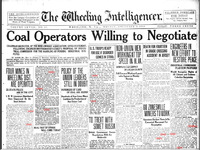 Coal Operators Willing to Negotiate, Front Page of The Wheeling Intelligencer 11.3.1919 Front page of The Wheeling intelligencer. Vol. LXVIII, No. 61 (Wheeling, W. Va.), 03 Nov. 1919. Chronicling America: Historic American Newspapers. Lib. of Congress.
Coal Operators Willing to Negotiate, Front Page of The Wheeling Intelligencer 11.3.1919 Front page of The Wheeling intelligencer. Vol. LXVIII, No. 61 (Wheeling, W. Va.), 03 Nov. 1919. Chronicling America: Historic American Newspapers. Lib. of Congress. -
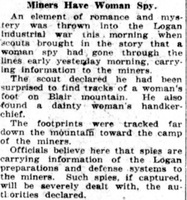 The Washington times. [volume] : (Washington [D.C.]) 1902-1939 The Morning Times was founded on March 18, 1894, by union printers. Financial difficulties, however, soon forced the printers to sell to Charles G. Conn, a Democratic congressman from Indiana. In August 1895 the Washington Evening Times was added, and the two editions sold as a combined subscription. The evening edition soon became dominant, substantially surpassing the morning paper's circulation. Late the following year, Conn sold both editions to Stilson Hutchins who had sold his interest in the Washington Post a few years earlier. In 1901 Frank A. Munsey, who was known for his consolidation practices and as a destroyer of the dailies, purchased the paper and ran it from the Munsey Building, which he had built on E Street in the northwest quadrant of the city. Munsey ceased printing the morning edition on November 29, 1902, and his evening and Sunday editions became known, simply, as the Washington Times. William Randolph Hearst gained control of the Times in 1917 and five years later merged it with the Washington Herald.
The Washington times. [volume] : (Washington [D.C.]) 1902-1939 The Morning Times was founded on March 18, 1894, by union printers. Financial difficulties, however, soon forced the printers to sell to Charles G. Conn, a Democratic congressman from Indiana. In August 1895 the Washington Evening Times was added, and the two editions sold as a combined subscription. The evening edition soon became dominant, substantially surpassing the morning paper's circulation. Late the following year, Conn sold both editions to Stilson Hutchins who had sold his interest in the Washington Post a few years earlier. In 1901 Frank A. Munsey, who was known for his consolidation practices and as a destroyer of the dailies, purchased the paper and ran it from the Munsey Building, which he had built on E Street in the northwest quadrant of the city. Munsey ceased printing the morning edition on November 29, 1902, and his evening and Sunday editions became known, simply, as the Washington Times. William Randolph Hearst gained control of the Times in 1917 and five years later merged it with the Washington Herald. -
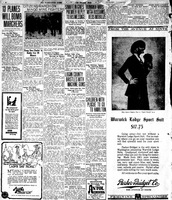 The Washington Times Front Page for September 1, 1921 Front page showing several articles and images regarding events leading up to the Battle of Blair Mountain
The Washington Times Front Page for September 1, 1921 Front page showing several articles and images regarding events leading up to the Battle of Blair Mountain -
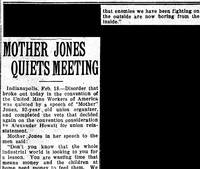 The Bismarck tribune. [volume] : (Bismarck, N.D.) 1916-current "Official newspaper for Bismarck and Mandan, N.D." Also issued on microfilm from the Library of Congress, Photoduplication Service. Archived issues are available in digital format as part of the Library of Congress Chronicling America online collection. Monthly ed.: Bismarck tribune (Bismarck, N.D. : 1943), 1943-1946. Sometimes published a morning edition and Sunday edition. Volume numbering irregular. Weekly ed.: Bismarck weekly tribune (Bismarck, N.D. : 1884), 1916-1943.
The Bismarck tribune. [volume] : (Bismarck, N.D.) 1916-current "Official newspaper for Bismarck and Mandan, N.D." Also issued on microfilm from the Library of Congress, Photoduplication Service. Archived issues are available in digital format as part of the Library of Congress Chronicling America online collection. Monthly ed.: Bismarck tribune (Bismarck, N.D. : 1943), 1943-1946. Sometimes published a morning edition and Sunday edition. Volume numbering irregular. Weekly ed.: Bismarck weekly tribune (Bismarck, N.D. : 1884), 1916-1943. -
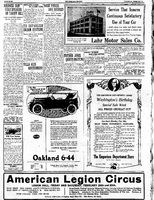 The Bismarck tribune. [volume] : (Bismarck, N.D.) 1916-current "Official newspaper for Bismarck and Mandan, N.D." Also issued on microfilm from the Library of Congress, Photoduplication Service. Archived issues are available in digital format as part of the Library of Congress Chronicling America online collection. Monthly ed.: Bismarck tribune (Bismarck, N.D. : 1943), 1943-1946. Sometimes published a morning edition and Sunday edition. Volume numbering irregular. Weekly ed.: Bismarck weekly tribune (Bismarck, N.D. : 1884), 1916-1943.
The Bismarck tribune. [volume] : (Bismarck, N.D.) 1916-current "Official newspaper for Bismarck and Mandan, N.D." Also issued on microfilm from the Library of Congress, Photoduplication Service. Archived issues are available in digital format as part of the Library of Congress Chronicling America online collection. Monthly ed.: Bismarck tribune (Bismarck, N.D. : 1943), 1943-1946. Sometimes published a morning edition and Sunday edition. Volume numbering irregular. Weekly ed.: Bismarck weekly tribune (Bismarck, N.D. : 1884), 1916-1943. -
 Can Do No Good Article The Washington times. [volume] : (Washington [D.C.]) 1902-1939 The Morning Times was founded on March 18, 1894, by union printers. Financial difficulties, however, soon forced the printers to sell to Charles G. Conn, a Democratic congressman from Indiana. In August 1895 the Washington Evening Times was added, and the two editions sold as a combined subscription. The evening edition soon became dominant, substantially surpassing the morning paper's circulation. Late the following year, Conn sold both editions to Stilson Hutchins who had sold his interest in the Washington Post a few years earlier. In 1901 Frank A. Munsey, who was known for his consolidation practices and as a destroyer of the dailies, purchased the paper and ran it from the Munsey Building, which he had built on E Street in the northwest quadrant of the city. Munsey ceased printing the morning edition on November 29, 1902, and his evening and Sunday editions became known, simply, as the Washington Times. William Randolph Hearst gained control of the Times in 1917 and five years later merged it with the Washington Herald.
Can Do No Good Article The Washington times. [volume] : (Washington [D.C.]) 1902-1939 The Morning Times was founded on March 18, 1894, by union printers. Financial difficulties, however, soon forced the printers to sell to Charles G. Conn, a Democratic congressman from Indiana. In August 1895 the Washington Evening Times was added, and the two editions sold as a combined subscription. The evening edition soon became dominant, substantially surpassing the morning paper's circulation. Late the following year, Conn sold both editions to Stilson Hutchins who had sold his interest in the Washington Post a few years earlier. In 1901 Frank A. Munsey, who was known for his consolidation practices and as a destroyer of the dailies, purchased the paper and ran it from the Munsey Building, which he had built on E Street in the northwest quadrant of the city. Munsey ceased printing the morning edition on November 29, 1902, and his evening and Sunday editions became known, simply, as the Washington Times. William Randolph Hearst gained control of the Times in 1917 and five years later merged it with the Washington Herald. -
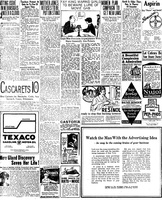 Can Do No Good: Full Paper
The Washington times. [volume] : (Washington [D.C.]) 1902-1939 The Morning Times was founded on March 18, 1894, by union printers. Financial difficulties, however, soon forced the printers to sell to Charles G. Conn, a Democratic congressman from Indiana. In August 1895 the Washington Evening Times was added, and the two editions sold as a combined subscription. The evening edition soon became dominant, substantially surpassing the morning paper's circulation. Late the following year, Conn sold both editions to Stilson Hutchins who had sold his interest in the Washington Post a few years earlier. In 1901 Frank A. Munsey, who was known for his consolidation practices and as a destroyer of the dailies, purchased the paper and ran it from the Munsey Building, which he had built on E Street in the northwest quadrant of the city. Munsey ceased printing the morning edition on November 29, 1902, and his evening and Sunday editions became known, simply, as the Washington Times. William Randolph Hearst gained control of the Times in 1917 and five years later merged it with the Washington Herald.
Can Do No Good: Full Paper
The Washington times. [volume] : (Washington [D.C.]) 1902-1939 The Morning Times was founded on March 18, 1894, by union printers. Financial difficulties, however, soon forced the printers to sell to Charles G. Conn, a Democratic congressman from Indiana. In August 1895 the Washington Evening Times was added, and the two editions sold as a combined subscription. The evening edition soon became dominant, substantially surpassing the morning paper's circulation. Late the following year, Conn sold both editions to Stilson Hutchins who had sold his interest in the Washington Post a few years earlier. In 1901 Frank A. Munsey, who was known for his consolidation practices and as a destroyer of the dailies, purchased the paper and ran it from the Munsey Building, which he had built on E Street in the northwest quadrant of the city. Munsey ceased printing the morning edition on November 29, 1902, and his evening and Sunday editions became known, simply, as the Washington Times. William Randolph Hearst gained control of the Times in 1917 and five years later merged it with the Washington Herald.
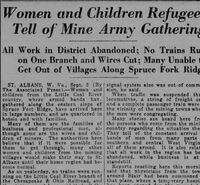 Women and children refugee tell of mine army gathering
Women and children refugee tell of mine army gathering